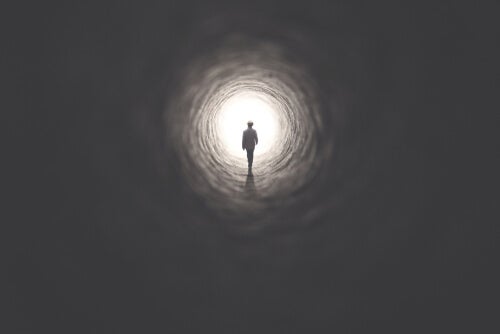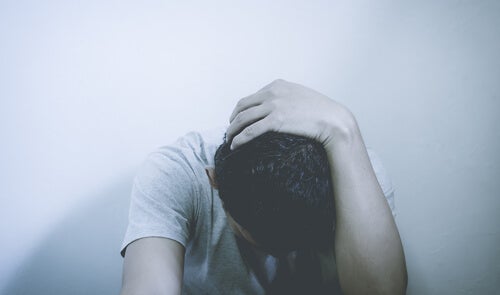Thanatophobia - The Fear of Death

The idea that one day you’ll cease to be conscious can be unsettling, to say the least. However, some people fear death so much that it keeps them from enjoying their life. This is known as thanatophobia.
This fear is usually quite paralyzing for those afflicted by it. Thoughts of their own death torture them and they become obsessed with them. Most humans don’t understand death despite being the fact that it’s a natural conclusion of the cycle of life.
“Life is a sexually transmitted disease; it’s lethal in 100% of the cases.”
-Anonymous-
Thanatophobia in daily life
People with thanatophobia have persistent thoughts about the end of their consciousness. In fact, they avoid places such as hospitals or cemeteries and dislike horror movies, coffins, and any other subject related to death.

Symptoms
Those who suffer from thanatophobia can have these symptoms:
- Anxiety.
- Obsessive and constant thoughts about death — both theirs and their loved ones.
- Depressive moods or depression.
- Dismay.
- Avoidance behaviors about everything related to death.
- Panic attacks.
- Sleep disturbances.
What’s behind thanatophobia?
Trauma
Many people who are afraid of death have negative experiences around it. They may have survived an accident or an attack.
The death of a family member can also trigger this fear and also witnessing a death-related event, both real or fictional. Even watching a movie can spark this fear.
Learned fear
There are many beliefs about the afterlife. Some people, cultures, and religions claim there’s life beyond death, while others subscribe to reincarnation. Then, there are those who think there’s nothing beyond death.
Death is disturbing to many. Thus, this fear or respect for it is quite normal in most people.
The fear of death is much less intense in those cultures that believe in reincarnation. In fact, they make it a point to live their current in a way that the next one will be better. Whatever people believe doesn’t change the fact that it either induces feelings of inner peace or awakens deep fears.
Avoiding the subject of death
A society that doesn’t talk about death does so because it obviously isn’t on good terms with it. Thus, it’s unlikely for them to foster a healthy relationship with this rite of passage.
Many people avoid thinking about death even though news of it abounds in newspapers and TV shows. These types of news are sad to most people but they, in fact, generate much anxiety and discomfort in a person with this phobia.
As per Gala León’s team in 2002: “Through this attempt at concealment and denial, we’re drawn into an evolutionary retro-process (retro-progress) that leads us to less mature states as well as lower stages of the evolutionary process of attitudes towards death“.

Dissolution of one’s identity
Another important element behind the fear of death is the loss of identity. This loss, in principle, supposes the lack of notion of an inner you that feels. Some people attribute dying to the cessation of feeling. What makes you “you” is no longer there and you cease to exist — or so you think.
This is because most people cling to a static concept of identity, which is perishable due to its very nature. However, paralyzing fear invades you as soon as you become aware that you have to let go of your vessel and identity.
Fears at the end of life
The aforementioned team of Gala León states that a series of fears that intensify the fear a person may feel appear at the end of life:
- There’s a fear of the dying process. Just thinking they’ll be both physically and psychologically in pain can be a source of agony for many people.
- Fear of losing control. This is because others are in control and make decisions for a person whose body is shutting down.
- There’s a fear of what’ll happen to a person’s loved ones after they die. Concern for one’s family is huge. Will they be okay? Are they in pain? Will they have everything they need?
- Fear of the fear of others. A person’s sense of fear increases when others are afraid.
- There’s a fear of the unknown. What’s behind death? How does it feel?
- Fear that life was meaningless.
How to deal with thanatophobia
Cognitive-behavioral therapy is the most commonly used treatment for thanatophobia. It focuses on a behavioral level as well as on a cognitive and physiological level.
The team of Mercedes Bordas (2011), from the University of Seville, proposes a series of objectives in her article:
- Control the symptoms of anxiety. The goal here is to control death-related symptoms at a physiological level and work on the thoughts related to death are worked on at a cognitive one. They may also apply techniques such as breathing or progressive relaxation.
- Reduce avoidance behaviors. They must do this both physically and in their mind.
- Finally, reduce the level of emotional distress associated with the experience of death and the process of dying. Cognitive restructuring is essential to work on the fear of death at this point.

Conclusion
Yes, death is a part of the cycle of life but that doesn’t keep people from being afraid of it. However, you must seek professional help if the fear is so intense it keeps you from going about your daily routine.
This is because this kind of help will give you the right tools to keep it from being disabling. As you can see, it’s the only way in which you’ll be able to enjoy your life again. What’s really important here isn’t dying but living fully and appreciating every little gift life brings your way.
This text is provided for informational purposes only and does not replace consultation with a professional. If in doubt, consult your specialist.








